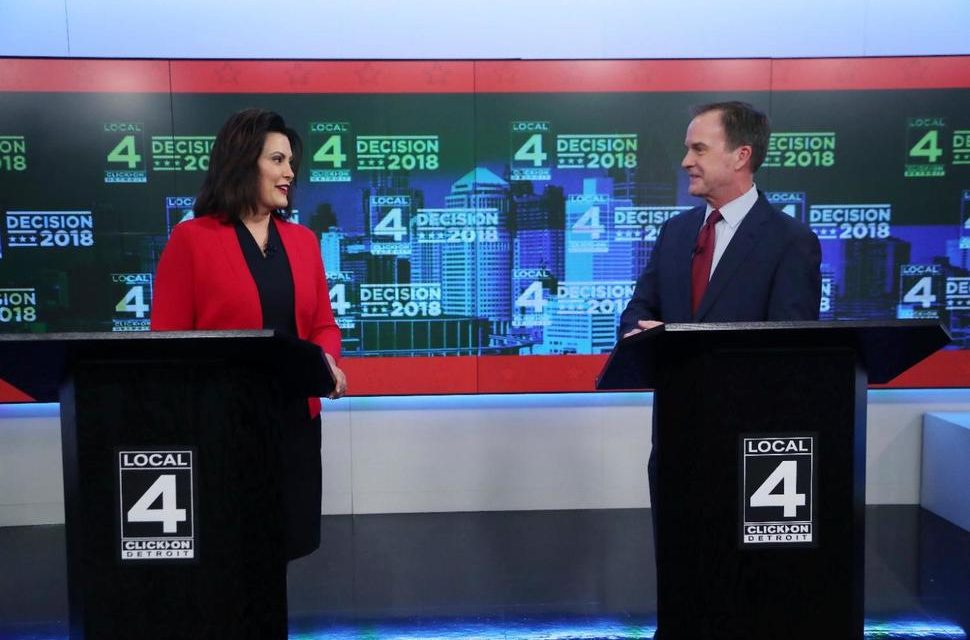Wednesday night’s gubernatorial debate broke no new ground but what stood out was Republican Attorney General Bill Schuette’s robotic approach, mentioning taxes 29 times over the course of one hour.
The standoff between Schuette and Democrat Gretchen Whitmer, former Minority Leader of the state Senate, mostly consisted of campaign talking points over now-familiar battle lines displayed in TV ads.
But Schuette stuck to his script so tightly that he managed to diverge into comments about taxes even when answering questions about LGBT rights, mental health and the Proposal 2 ballot initiative to end gerrymandering of legislative districts.
What the GOP nominee failed to mention – and Whitmer, somehow, also ignored – is that the Schuette income tax cut amounts to less than $3 a week for the typical middle class household. Rather than serving as a bold plan, the Schuette proposal would almost pay for one Starbucks specialty coffee weekly, supposedly with a family of three or four sharing the beverage.
After the debate at the WDIV-Channel 4 television studio in Detroit, Tim Skubick, dean of the Lansing press corps, suggested that Republicans may be happy that Schuette was “staying on message.”
But Robo-Bill was relentless, to the point that his incessant repetition gradually moved from irritating to laughable.
His approach was to hammer away at his “paycheck agenda,” putting more money in people’s pockets through tax cuts and reductions in auto insurance rates. Without those two moves, he said, Michigan will go “back into the ditch” of job losses and a failing economy.
In reality, no reasonable plan to cut insurance costs will produce a big windfall for Michigan motorists. And a family with an income in the $50,000 range — with a routine taxable income of about $40,000 after exemptions, deductions and credits – would see a gain of just $140 a year under the tax plan that Schuette mentioned 29 times.
Many of Schuette’s buzzwords about taxes served as a contrast as he claims that Whitmer will raise taxes and he will lower them. However, the Democratic nominee has proposed a gas tax hike to fund roads, while she also agrees with Schuette that Michigan should end the tax on retirees’ income. That’s it. She has taken no other positions on tax levies.
To be clear, both candidates fudged the facts at times last night and offered answers that amounted to playing politics. The fact-checkers at Bridge Magazine have detailed those deficiencies. Bridge has also documented how both candidates’ overall plans would blow a big hole in the state budget.
But the idea that a $3-a-week income tax cut will jolt the economy is absurd. In early 2017, the tax cut now envisioned by Schuette was rejected in the state House due to opposition from a group of GOP lawmakers and outgoing Gov. Rick Snyder. Pragmatic legislators knew that the decrease in revenues would put Michigan in the position of dealing once again with a budget deficit.
At issue is the after-effects of the 2007 income tax hike, from 3.9 percent to 4.35 percent, when the state budget was in shambles. The intent was a gradual reduction back to the previous rate, but that incremental approach stopped at 4.25 percent.
Tax cuts are a sure-fire winner on the campaign trail, but mounds of evidence indicate that their impact on economic growth is mostly exaggerated. As the corporate world would say, tax cuts for companies and individuals suffer from a lack of ROI – return on investment.
One of Schuette’s biggest backers, Business Leaders for Michigan (BLM), made it clear in late September that more tax cuts is not a policy priority.
“Not on our list,” said BLM’s CEO, Doug Rothwell. “If you’re looking at it just purely from an economic growth standpoint, we’ve not identified pension or personal income taxes as things that rise to that level.”
By way of textbook economics, the huge $1.8 billion corporate tax reduction successfully pushed by Gov. Snyder in 2011 should have resulted in substantial economic growth. Yet, evidence that the Snyder tax cuts have made Michigan a prime destination for corporate America is pretty thin.
Michigan now ranks 33rd among all states with a corporate tax that amounts to just $119 annually on a per-capita basis. Michigan shed its label as a high-tax state years ago and it ranks near the top of the list as a state with a strong business climate. At the same time, the state’s unemployment rate has fallen to just 4 percent.
The state economy is strong, taxes are relatively low. So, why the obsessive Schuette mentions of these two issues when the state faces so many challenges?






